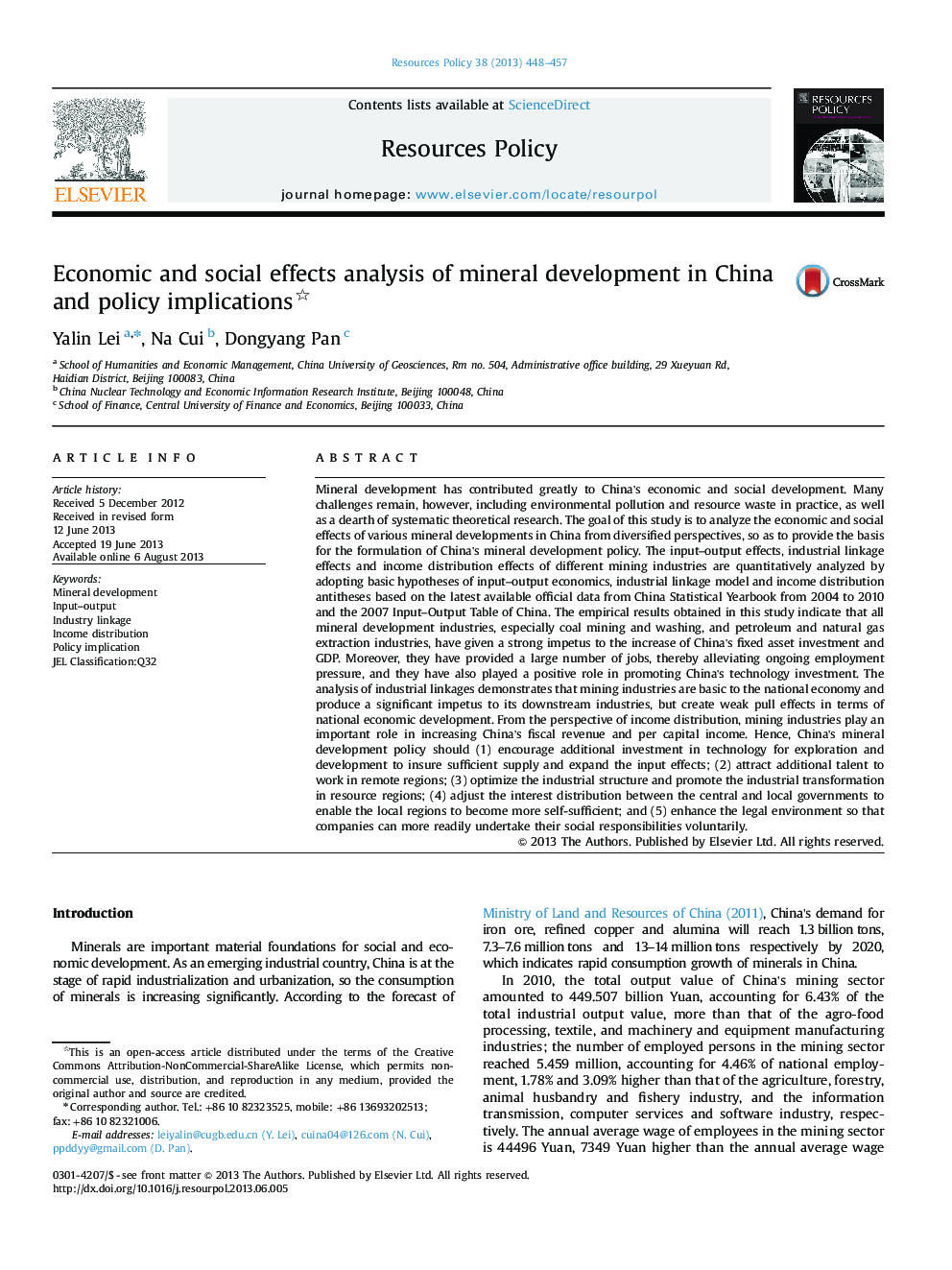| کد مقاله | کد نشریه | سال انتشار | مقاله انگلیسی | نسخه تمام متن |
|---|---|---|---|---|
| 10484037 | 934841 | 2013 | 10 صفحه PDF | دانلود رایگان |
عنوان انگلیسی مقاله ISI
Economic and social effects analysis of mineral development in China and policy implications
ترجمه فارسی عنوان
تجزیه و تحلیل اثرات اقتصادی و اجتماعی توسعه معدنی در چین و پیامدهای سیاست
دانلود مقاله + سفارش ترجمه
دانلود مقاله ISI انگلیسی
رایگان برای ایرانیان
کلمات کلیدی
ترجمه چکیده
توسعه معدنی تا حد زیادی به توسعه اقتصادی و اجتماعی چین کمک کرده است. با این حال، چالش های بسیاری باقی مانده است، از جمله آلودگی محیط زیست و منابع زیست محیطی در عمل، و همچنین کمبود تحقیقات نظری سیستماتیک. هدف از این مطالعه بررسی اثرات اقتصادی و اجتماعی پیشرفت های معدنی مختلف در چین از دیدگاه های متنوع است تا مبنای فرموله کردن سیاست های توسعه معادن چین باشد. اثرات ورودی-خروجی، اثرات اتصال صنعتی و اثرات توزیع درآمد صنایع مختلف معادن با استفاده از فرضیه های اساسی اقتصاد اقتصاد ورودی-خروجی، مدل اتصال صنعتی و توزیع درآمد بر اساس آخرین اطلاعات موجود از سالنامه آماری چین از سال 2004، تجزیه و تحلیل شد تا 2010 و جدول ورودی-خروجی 2007 چین. نتایج تجربی حاصل شده در این تحقیق نشان می دهد که تمام صنایع توسعه صنایع معدنی، به ویژه معادن زغال سنگ و شستشو، و صنایع استخراج نفت و گاز، انگیزه ای قوی برای افزایش سرمایه گذاری ثابت دارایی چین و تولید ناخالص داخلی داشته اند. علاوه بر این، آنها تعداد زیادی از مشاغل را فراهم کرده و در نتیجه فشارهای اشتغال مداوم را کاهش داده اند و همچنین نقش مثبت در پیشبرد سرمایه گذاری در فن آوری چین ایفا کرده اند. تجزیه و تحلیل ارتباطات صنعتی نشان می دهد که صنایع معدنی پایه ای برای اقتصاد ملی هستند و باعث ایجاد انگیزه قابل توجهی برای صنایع پایین دست خود می شوند، اما از نظر اقتصادی توسعه اقتصادی، اثرات ضعف و ضعف ایجاد می کنند. از منظر توزیع درآمد، صنایع معدنی در افزایش درآمد مالی چین و درآمد سرانه نقش مهمی ایفا می کنند. از این رو، سیاست توسعه معادن چین (1) باید سرمایه گذاری های اضافی در فن آوری را برای اکتشاف و توسعه تشویق کند تا تأمین کافی را تامین و تأثیرات ورودی را افزایش دهد؛ (2) استعداد اضافی برای کار در مناطق دور افتاده را جذب کنید. (3) بهینه سازی ساختار صنعتی و ترویج تحول صنعتی در مناطق منابع؛ (4) توزیع علاقه بین دولت های مرکزی و محلی را تنظیم کنید تا مناطق محلی را به خودکفایی بیشتر تبدیل کنید. و (5) محیط قانونی را افزایش می دهد تا شرکت ها بتوانند به راحتی مسئولیت اجتماعی خود را به طور داوطلبانه انجام دهند.
موضوعات مرتبط
مهندسی و علوم پایه
علوم زمین و سیارات
زمین شناسی اقتصادی
چکیده انگلیسی
Mineral development has contributed greatly to China's economic and social development. Many challenges remain, however, including environmental pollution and resource waste in practice, as well as a dearth of systematic theoretical research. The goal of this study is to analyze the economic and social effects of various mineral developments in China from diversified perspectives, so as to provide the basis for the formulation of China's mineral development policy. The input-output effects, industrial linkage effects and income distribution effects of different mining industries are quantitatively analyzed by adopting basic hypotheses of input-output economics, industrial linkage model and income distribution antitheses based on the latest available official data from China Statistical Yearbook from 2004 to 2010 and the 2007 Input-Output Table of China. The empirical results obtained in this study indicate that all mineral development industries, especially coal mining and washing, and petroleum and natural gas extraction industries, have given a strong impetus to the increase of China's fixed asset investment and GDP. Moreover, they have provided a large number of jobs, thereby alleviating ongoing employment pressure, and they have also played a positive role in promoting China's technology investment. The analysis of industrial linkages demonstrates that mining industries are basic to the national economy and produce a significant impetus to its downstream industries, but create weak pull effects in terms of national economic development. From the perspective of income distribution, mining industries play an important role in increasing China's fiscal revenue and per capital income. Hence, China's mineral development policy should (1) encourage additional investment in technology for exploration and development to insure sufficient supply and expand the input effects; (2) attract additional talent to work in remote regions; (3) optimize the industrial structure and promote the industrial transformation in resource regions; (4) adjust the interest distribution between the central and local governments to enable the local regions to become more self-sufficient; and (5) enhance the legal environment so that companies can more readily undertake their social responsibilities voluntarily.
ناشر
Database: Elsevier - ScienceDirect (ساینس دایرکت)
Journal: Resources Policy - Volume 38, Issue 4, December 2013, Pages 448-457
Journal: Resources Policy - Volume 38, Issue 4, December 2013, Pages 448-457
نویسندگان
Yalin Lei, Na Cui, Dongyang Pan,
